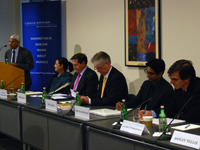Registration
You will receive an email confirming your registration.
The Carnegie South Asia Program remembered and celebrated the life and work of K. Subrahmanyam, India’s foremost defense strategist, who passed away on February 2, 2011, in New Delhi. Over the past forty years, “Subbu,” as he was fondly known to his friends, profoundly shaped India’s foreign and defense policy through his work and writings. Meera Shankar, India’s ambassador to the United States, Brookings’s Stephen Cohen, Peter Lavoy from the office of the Director of National Intelligence, Neil Joeck from the National Intelligence Council, the German Marshall Fund’s Dhruva Jaishankar, and Carnegie’s Ashley J. Tellis and George Perkovich spoke about Subbu as a public intellectual and his contributions to many aspects of India’s strategic policies.
Larger than Life
Tellis opened by noting that Subbu was a larger-than-life figure in India’s national security debates for more than forty years. He nurtured a generation of intellectuals, many of whom now dominate policy discussions in New Delhi. Shankar described Subbu as a father figure to India’s strategic community who injected a dose of realism and an appreciation of real power into India’s world view. Subbu shaped the conversation in many key areas, the participants said:
- Nuclear Weapons: After China’s nuclear tests, Shankar said, Subbu urged India to retain its nuclear option and refrain from joining the Nuclear Non-Proliferation Treaty, changing the debate on this issue. After India developed nuclear weapons, Subbu became the voice of reason, urging responsibility, restraint, and a policy of no first use. Perkovich noted that while Subbu broadly critiqued the international system and the behavior of the United States and the Soviet Union, he argued that in a world where nuclear weapons defined power, India would need nuclear weapons to participate in world affairs.
- National Security Council: Shankar also noted how Subbu argued forcefully that existing security institutions were inadequate to deal with the complexity of modern security, and that an Indian national security council was essential to integrate disparate security elements such as the military and intelligence services in a holistic way.
- U.S.-India Relationship: Though he criticized U.S. policies during the Cold War, Subbu became a strong advocate of engagement between India and the United States, and his advocacy on the U.S.-Indian nuclear deal helped to shape the national consensus, Shankar said. Tellis said Subbu believed the United States and India were fated to become strategic partners because of shared beliefs and values. Subbu was a complex nationalist who saw advantage in a partnership with the United States and believed that strong ties with Washington would hasten India’s rise globally, Tellis noted.
- Ministry of Defense Reform: Cohen addressed Subbu’s efforts at reforming the Ministry of Defense and on intelligence issues. Subbu believed in an efficient and effective modern Indian state, and sought to both defend and improve the system. He showed great courage by expressing unpopular views and by providing support for those who had angered the establishment, Cohen added.
Intellectual Force
Joeck noted Subbu’s ability to challenge the public to think about issues that were uncomfortable or considered settled, such as nonalignment and China.
- Nonalignment: Joeck related how Subbu rejected the idea of nonalignment as an ideology but saw it rather as a rational means to achieve national security objectives.
- China: Subbu looked beyond China’s financial and military clout to its knowledge base, Joeck remembered, which helped inform his view of the United States and India as natural allies. As China rose, Subbu believed that India and the United States would naturally come together to balance against this emerging economic, military, and knowledge power.
- India’s Potential: Lavoy stated that Subbu saw India as a great power in the making and wanted to help it attain this great power status by applying the principles of realism in its foreign policy.
- The Influence of War: India’s wars proved to be the watershed events that shaped Subbu’s thinking and rise, Lavoy said. His experience in the 1962 war with China and the 1971 war with Pakistan shaped his views on military strategy, defense, nuclear weapons, and nuclear strategy. More recently, the Kargil crisis in Kashmir and the outbreak of armed conflict between India and Pakistan reinforced his views about Pakistan and how India should conduct its affairs with its neighbor.
- Kargil Report: Lavoy recalled how Subbu was chosen by the Indian government to chair the review committee on the Kargil conflict, a wise and brave choice given his well-known outspoken nature and views. Subbu said the Pakistani intrusion completely surprised the Indian government and represented a major intelligence failure, citing evidence of systematic problems rather than blaming a single individual or institution. The government has acted on several of his recommendations, such as the creation of the National Technical Research Organization devoted to technical intelligence, but did not enact them all. Levoy argued that if the government had followed all of Subbu’s recommendations, India’s response to the attack in Mumbai could have been more effective.
Subbu, the Person
Shankar described Subbu as someone indifferent to position, wealth, and creature comforts and completely consumed with ideas. Several of the participants commented on his sometimes abrasive personality, although Tellis noted that while Subbu never let up on a foolish argument, he was also never mean-spirited in debate. Perkovich observed that for all of Subbu’s cerebral analysis, he was at his core morally inspired, and his heart guided him in a lot of ways. Subbu rejected bureaucratic groupthink, refused to yield to political pressure, and was India’s dominant intellectual because he focused primarily on ideas. These ideas live on in a number of new intellectuals, as Jaishankar fondly recalled Subbu’s willingness to mentor many budding scholars, who now range in age from their 20s to 70s.
